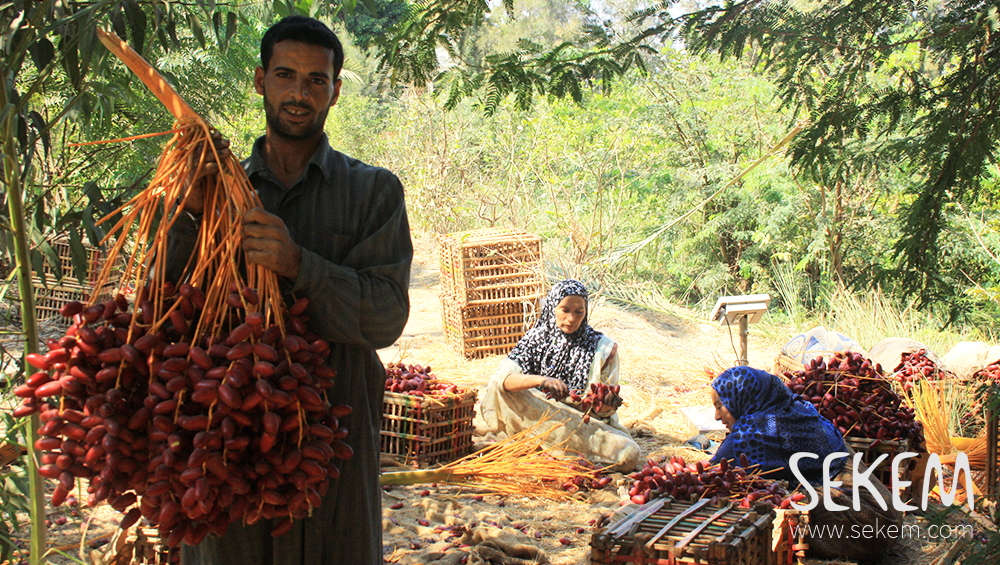Late summer in Egypt means time for dates. Throughout the whole country, palm trees are hanging full of red and yellow panicles. At every street corner merchants sell the still hard fruits. In Egypt, people love dates in this state, but also later when they are mellow and sweet. Dates are an all-rounder talent. Healthy energy suppliers and sweets at the same time. Besides, they also carry a long history with them.
According to archaeological findings, the desert tree is the oldest plant cultivated by people. And Egypt is the world’s largest date supplier. Of course, SEKEM also owns a comprehensive quantity of the so-called “bread of the desert” – needless to mention, biodynamic certified. The SEKEM farm is surrounded by palm trees and each contracted farmer of SEKEM has at least a small stock for its own use or even a whole plantation of the popular fruits.

In late summer time, Saeed Hassaneen can be seen daily on the SEKEM Farm. He rides his bike over the terrain, climbs nimbly on each palm and cuts the up to 20 kilogram heavy panicles. Almost an artistic performance. With only a rope that is going around his back and the palm trunk, and a large knife he harvests the dates. Saeed is the date specialist in SEKEM for over 7 years now. If he doesn´t harvest he takes care of the shade giving plants. Hence, for instance the fronds have to be cut regularly so that the dates can be reached at harvest time. With the cutted material baskets are woven, roofs are covered and even furniture is made.
Date palms are diocious plants. That means that a palm forms either male or female flowers. Only female date palms bear fruits. Over the years, the roots build, next to the mother plant, new cuttings. Saeed removes them from the trunk and places them somewhere in the ground. When the female plants bloom in spring they are dusted with the pollen of the male plants.
Organic Dates from Egypt
SEKEM has been planting and selling dates since the 1980s. Meanwhile, there are around 800 tons produced annually. Around 200 tons are harvested on the SEKEM Farm. The rest comes from contracted farmers of SEKEM and from the SEKEM Farm in the oasis El Bahariya in the Western desert of Egypt. The oasis has always been known for their dates. From more than 1500 various kinds worldwide, SEKEM is planting here two sorts: The Egyptian Siwa-dates, which are very durable and produce around 90 kilograms of fruits per palm and year, as well as the noble Barhi-variety that is one of the sweetest and most popular desert fruits worldwide.

The Demeter-certified dates are either harvested in still hard condition of the palms and then slowly mature in the shadow beneath the tree or they remain on the palm until they begin to turn brown. In SEKEMs company ISIS Organic, the fruits are stored and throughout the year permanently employed SEKEM co-workers clean them in a date washer and temporary heat them in an oven. The dates are then pitted and checked for quality by hand before they are packed for export or for the local market.
The SEKEM dates are especially popular when they are stuffed with peanuts or almonds and provided on a handmade plate from palm leaves in the supermarket shelves. In the Islamic fasting month Ramadan, it is a long tradition to eat dates at the beginning of fast-breaking. The Prophet Mohammed is said to did it like this. Dates are namely mentioned several times already in the Holy Koran and in the Bible. Because of their long durability and the variety of use the date palm is considered in the Christian tradition as the tree of life and has become a symbol of the resurrection.
60 percent of the annually harvested dates are exported all over the world. In Germany, for example, SEKEMs longtime Organic partner “Davert” processes the dates to delicious date confectionary. Here they have a great vogue during the Christmas season. In this context, a SEKEM Advent calendar filled with different date variations is available in Organic supermarkets and online now.
Healthy sweets
However, the sweet fruits aren´t only sweet treats, but also very healthy. They have a high content of B-vitamins, calcium, phosphorus, iron, magnesium, zinc and copper. People who feel quickly tired or stressed should eat dates. The amount of potassium exceeds even the one of bananas by 50 percent and dates contain more fiber than wholemeal bread. Unlike grapes or figs dates don´t begin to rot. Instead, a continuous drying process starts. Firmer dates with higher content of starch and protein are still used today by the Bedouins for baking bread.

The palms are also excellent in providing shade, wind resistant and can be further processed in various ways. The pits are oil suppliers, the trunk is used for building houses and the panicles can be processed to practical brooms. In SEKEM all other remnants are used for composting or as animal feed. By biological compost fertilizing the soil can store more than 20 percent water. Hence, palm trees that already have a relatively small irrigation demand, support the economical use of water which is particularly important in Egypt. Generally, SEKEM is putting a lot of efforts in the sustainable cultivation of the desert trees and waters some plantations partially by solar-powered water pumps.
Therefore, we can enjoy dates with a clear conscience. Especially when they are grown Organically or Biodynamically, they are healthy and sustainable for humans and nature. And: The “bread of the desert” has a long history that even tells about the history of mankind.
Christine Arlt
Read more about SEKEMs Advent Calendar
Read more about the opportunities and challenges of SEKEMs contracted farmers
Get to know the new date products of Davert and SEKEM

